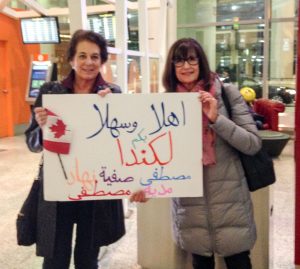Narayever synagogue’s private sponsorship builds community

PHOTO COURTESY NARAYEVER SYNAGOGUE: Narayever members Mona Kornberg and Ricki Sharpe greet the Syrian family at the airport.
By Clarrie Feinstein
It took almost two years, but in March the First Narayever Congregation on Brunswick Avenue was finally able to welcome a Syrian refugee family into their community. When the couple and their five-year-old son arrived in Toronto, they became one of 14,000 privately sponsored families now living in Canada.
For the congregation, the journey began in September 2015 when its Social Action Committee made the decision to sponsor a Syrian refugee family. For the determined committee members, it was an easy decision.
“We want them to know that there is a strong support group for them here, they are not alone”—Lia Kisel, Jewish Immigrant Aid Services
“We did it for a number of reasons,” says Pippa Feinstein, chair of the Social Action Committee. “As Jews we felt it was important to take a stand for other people who were being displaced and persecuted because of the Jewish history of displacement and persecution. There was a moral obligation.”
The committee created an active listserv with 100 people from the congregation who were eager to aid the sponsorship.
“Some days I would get up to 80 emails from the community on how to help with the sponsorship,” says Feinstein.
“This really brings the community together,” says committee member Micky Fraterman. “I also do work with the Church of the Redeemer, [whose congregation is a] seasoned sponsor and we have so far brought in three other refugee families from Iraq and Burma.”
This activism also allows members of the Jewish community, who are not necessarily religious, to use their professional skills to connect with the community in an active way, as some social workers and lawyers contribute their expertise to the difficult process of sponsoring refugees.
The Narayever partnered with the Jewish Immigrant Aid Services (JIAS), which is a government- and community-funded immigrant service organization providing comprehensive services to 8,000 immigrants a year. JIAS is a Sponsor Agreement Holder, a group that has signed an agreement with the Government of Canada that allows them to support refugees from abroad when they come to Canada. The Narayever and JIAS submitted their paperwork over two years ago, and the family arrived this spring.
“We offer settlement and integration services, which encapsulates everything,” says Lia Kisel, director of Language and Settlement at JIAS. “This includes English-as-a-second-language classes, literacy workshops, employment counselling, healthcare, school enrolment, and bank account and phone account set-ups — you name it. And we have capable social workers who can help with the psychological trauma and cultural shock the families are experiencing. It is an extremely difficult adjustment and transition they are making.”
There are volunteers around for 24 hours of the day, providing counselling and social services to the families. “We want them to know that there is a strong support group for them here, they are not alone.”
While there are translators offered and English classes are mandatory, the language barrier is the hardest obstacle to tackle in the transitioning period. Without this skill, the employment rate is low and economic alleviation is almost non-existent. Government-assisted refugees receive $9,500 as a start-up and $1,600 a month for the first year, providing barely enough money for basic necessities.
But what Kisel has found since working with JIAS for the past 13 years is that the families are just relieved to be safe.
“We focus specifically on family reunification and they are just happy to be reunited with their loved ones and to be in an environment where they do not have to fear for their life. They are always so grateful.”
While members of the Narayever volunteer their time to assist with the transition period for their sponsored family it is only the beginning of an arduous journey ahead.
“You are dealing with some people who are not literate in their native language,” explains Fraterman. “It is such a difficult process acclimatizing them to Canadian society. You’re teaching them the concept of rent and bank accounts, because it’s completely different from their own communities.”
Even though the work is taxing, Fraterman finds the experience to be ultimately rewarding, a sentiment shared by Kisel.
And while the support from the Jewish community was overwhelming it was not surprising for Kisel: “when people want to come together and help others in a desperate situation it impacts the relationship the Jewish community has with other communities. Reform synagogues are working with orthodox synagogues; we have a mosque and a synagogue working together…. It just speaks to our shared strengths, values, and principles.”
The future for the Syrian family is uncertain, but it is one that at least guarantees basic security from the life-threatening situations they were experiencing during the Syrian conflict.
“It’s still early days for the family,” says Feinstein. “We can’t predict what the future holds in store for them.”
Pippa Feinstein, chair of Social Action Committee, is the writer’s sister.
READ MORE:
HISTORY: Yiddish sign evokes rich history (October 2016)
NEWS: Building community over fattoush (June 2016)
NEWS: A warm welcome for new arrivals (January 2016)
EDITORIAL: Embrace refugees (December 2015)
NEWS: Churches raise funds for refugees (November 2015)
HISTORY: First Narayever marks 100 (February 2015)
